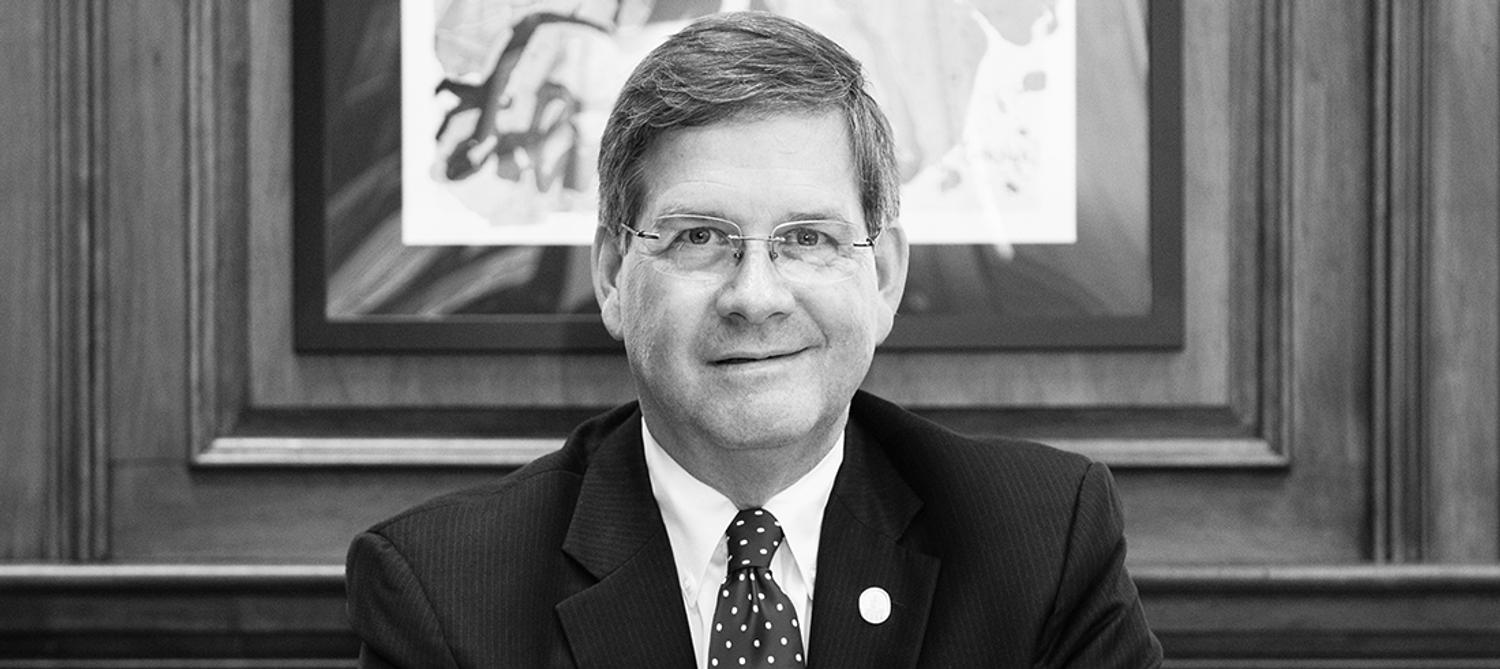Interviewed by Kevin O’Neill
Q&A with Dr. William Ruud
Dr. William Ruud has always had a positive attitude, and one of his greatest joys is using it to inspire leadership in others.
As president of Marietta College in southeast Ohio, one of the top contemporary liberal arts institutions in the region, that positive outlook serves him well — especially in times of crisis. Having served in higher education for many years, Dr. Ruud has experience guiding teams through disruptions. He brings those skills to his leadership at Marietta College, a resilient institution that has not only survived but thrived during its nearly 200-year history. Dr. Ruud leads it with honesty, trust, and communication at the core.
In early May 2020, Kevin O’Neill, managing partner and co-founder of Acertitude, sat down with Dr. Ruud to discuss how he keeps to his core values when leading his institution through the pandemic. The following insights can help guide your organization through disruption.
Take the hill
Kevin: What has it been like to lead Marietta College through the coronavirus pandemic? Have you adjusted your leadership style?
Dr. Ruud: No doubt, these are challenging times. But leadership is about handling challenges, and I work with an incredibly dedicated and talented leadership team. Our combined skills, experiences, training, and commitment to Marietta College helped us respond immediately. Everyone in this organization stepped up! Marietta College will come through this better and stronger.
My U.S. military experience helped train me for a moment like this. You remain focused on one mission: keep the college running to provide students with a great education. For example, we immediately seized on this as an opportunity to offer our incoming students a live summer Zoom Webinar — “Pioneering through a Pandemic” — to teach critical thinking and leading in a crisis. Faculty in every discipline teach, and attendance has been incredible! We are prepared to pause, pivot, change, and adapt quickly to carry out our mission.
The process of leading through this crisis has required a combination of paying attention to the science, the politics, and the leadership. We are fortunate that Ohio Gov. Mike DeWine acted quickly to shut us down, which also allowed us to open up early. We carefully monitor and follow those guidelines in developing our plans.
In a crisis, don’t reinvent the wheel. Make a note of what others in your industry do, gather information, and then act. Higher education is a great example. I follow and take cues from other colleges and universities — whether that’s by emulating or diverting from their plans. For example, some colleges concerned about a second wave of COVID-19 are bringing students back early so they can end the fall semester by Thanksgiving. Others will only teach online this fall. We are considering those and other decisions. We want to consider all good ideas, but we also want to be patient, focus on health and safety, and have our mission guide our response as we look forward to reopening Marietta College for in-person instruction this fall.
Communication is key, and we embrace our responsibility to communicate as transparently as possible. Many stakeholders — students, alumni, faculty, staff, board members, alumni, and others — must be informed, even if the updates seem minor. We also consider individual situations. We reached out to our students with numerous questions: “What’s your situation?” “How can we help?” “What can we do better?” I’ve worked to create an environment where everyone values communication. We listen to what others have to say — especially in this unprecedented time, when we must consider as many diverse ideas as possible before making decisions.
Personally, I haven’t modified my approach a great deal. I try to be as open, honest, and transparent as possible. In a crisis, you have to be comfortable telling people something they may not want to hear. You also have to push through that discomfort to get to a place of trust. Especially in a crisis, leaders must remain calm and sensible in their communications while communicating clearly, directly, truthfully — and often.
I’ve also learned that sometimes leaders must act quickly. Still, you never want to make a decision too quickly and without the key facts — especially when leading a large organization. After all, that decision will affect stakeholders in myriad ways.
Communicate often and openly
Kevin: Marietta College is a special place. How do you keep engagement up without a campus to congregate?
Dr. Ruud: Humans are social creatures. This isolation is hard on everyone. At Marietta, we try to ease that by communicating constantly. Through personal phone calls, meetings, emails, letters, Twitter, Instagram, Facebook Live, and a plethora of other methods, we stay active. The simple act of posting a picture of my wife and me walking along the Christy Mall is comforting. It shows students and other stakeholders that we are still here, despite the uncertainty happening in the world.
Again, it’s essential to talk to as many stakeholders as possible. I’m known for responding quickly to emails and phone calls and being available at any time. While our entire leadership team is readily available, we realize that everyone needs personal time, and we work hard to provide that to each other and everyone working with us. We care for each other without ever wavering from our commitment to communicating and moving forward, and we hope that will continue to motivate and engage people.
Many people feel scared and unsure right now, but open communication helps keep them informed and engaged. We’re careful to be truthful; instead of merely saying everything’s going to be fine, we provide information. If we want stakeholders to stay engaged, we must be honest. When appropriate, we also show our human side by letting them know about our concerns. We remain positive while letting everyone know that we will get through this together.
Be an unshakeable optimist
Kevin: This is your third presidency, and you have seen positive results at every institution you have led. What are the major drivers of your success?
Dr. Ruud: I always have a 90-day plan. After all, you can never assume the latest organization you are leading looks like the last one. In the first 90 days, talk to everybody. You will realize there may be things that don’t need to be figured out. The things you do have to figure out are the ideas multiple people bring up. As a leader, you should absorb that information so you can handle the biggest problems and implement the greatest ideas.
In addition, I’m an optimist. If someone tells me about five ways we can’t do something, I want to know one or two ways we can. I want their ideas rather than just mine. When leading an organization, there will always be challenges, but I work by the “halfway to the wall” principle. You may never get to the wall, but the distance will get smaller and smaller every day, allowing you to improve and get one step closer to success.
Throughout my career, that optimistic mindset has shown me that it’s often the procedures and processes that need adjusting rather than the people — so there’s no need to go on a firing spree. I learn the best by walking around and hearing about the organization from others instead of by sitting in my office. During those times, people share their ideas with me — and those are often great ideas!
Lead like a coach
Kevin: Looking back at your experience with and research on management theory, organizational behavior, and leadership assessment, what are the three most significant leadership lessons you can pass onto others?
Dr. Ruud: The first would be something I learned in the military that stuck with me. My sergeant always said, “You’ve got two eyes, two ears, and one mouth — use them proportionally.” Take things in before you speak. Listen to understand instead of listening to respond. Keep learning, and always be willing to learn from our differences. Seek out those differences and respect them. That’s how we make the best decisions.
The second would be the old adage of leading by example. Leaders must be willing to do the tasks they ask others to do, whether that’s dealing with budgets, putting paper in the copier, or delivering something to another office. Additionally, leaders must watch what they do and say; as role models, people are always watching. Leaders must have good ethical and moral character — and always act to reflect that character.
The third lesson is to understand your strengths and weaknesses. It’s important to work on your weaknesses — for many of us, that’s a lifelong process. I also believe that you should concentrate on your strengths and then surround yourself with people to fill in any gaps. You should also help others in the organization learn. Offer exciting and unique opportunities tailored to their interests, like sending people to conferences on their favorite subjects. Communicating success stories of employees who have improved through learning experiences fosters even more learning.
Hire people willing to take initiative
Kevin: You have recruited many leaders throughout your career. How have you made your best hires?
Dr. Ruud: When hiring, it’s important to look for people who complement or supplement the skills, strengths, and perspectives that you and your organization already have. It’s also critical to hire individuals who have great integrity; people who are willing to speak up — especially if they disagree with you. My best hires tend to be independent critical thinkers who can look at me and comfortably say, “I disagree, and here’s why.”
At the senior level, you need people who will be honest with you; they should be able to communicate hard truths effectively. It’s also critical to have a diverse workforce that includes people who have different perspectives and who are willing to share those with you to improve the organization. Not everyone will agree on everything, and that’s a good thing — especially if you listen to learn.
Look for people with drive. It is unproductive when leaders have to communicate instructions constantly. You want people who have the confidence and knowledge to know what you are thinking and act on it. If the decisions they make go wrong, a great leader takes accountability — poor leaders only take responsibility when things go right.
Remember that someone helped you get to where you are today. Pay it forward by helping others. Give them a chance to develop and become leaders themselves.
Finally, there is nothing more powerful than integrity and telling the truth. Be transparent, honest, and positive at all times. If you build those open communication channels, then everything else you need to lead will fall into place — regardless of what crisis disrupts your organization.
Defining brilliance with Dr. Ruud
| Purpose is... | energy and helping others. |
| Leadership is... | understanding for whom you work and managing by walking around to ensure you know what people are thinking. |
| Brilliant leaders are... | curious, risk-takers, and willing to lift others up. |
| Success is... | a relative measure of being the best you can be with what you’ve been given. |
| I perform at my best when... | situations get incredibly challenging, and I’m able to work collectively to fix them within the time constraints. |
Never miss insights
Stay in the know with our thought leadership
Kevin's thinking
Leadership
The Value Multiplier: Why Private Equity's Best CEO-OP Partnerships Start with the Right CFO
Jul 21, 2025

Sports & Entertainment
How Top CROs Are Unlocking New Revenue Streams in Sports – with Data and Collaboration
May 05, 2025

#BrilliantPeopleAtWork
Marc Jourlait: Riverside Operating Partner on the Journey and Joy of Fixing Broken Businesses
Oct 06, 2023

